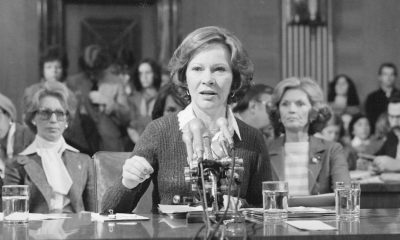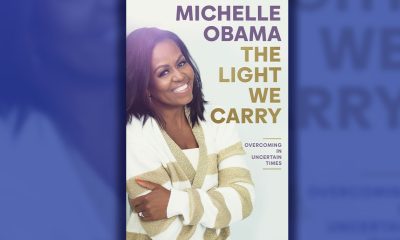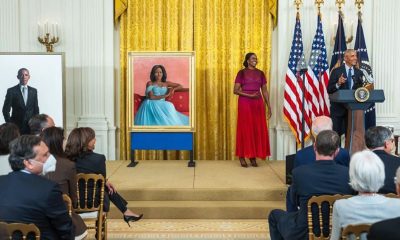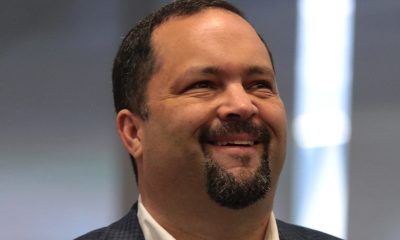Op-Ed
When Fashion Clashes with Religious Customs
By Lekan Oguntoyinbo
NNPA Columnist
I believe customs generally fall into three categories: inexcusable, curious if a little questionable, and fascinating.
Some customs – the rigid caste system in India, the practice by in-laws in many parts of Africa of putting newly-widowed women and their kids out on the streets, as well as deeply held racist beliefs and practices in the United States, particularly in the Deep South – easily qualify as abhorrent. So do others such as the murders of female rape victims in many Middle Eastern countries by male relatives, female genital mutilation and ritual human sacrifices in many African countries.
Most right thinking people would agree that such practices are just plain wrong.
Often times, though, it is the curious customs that stir things up. They amaze us and maybe even cause us to shake our heads.
I’ve been thinking a lot about curious customs lately in view of the first couple’s recent visit to Saudi Arabia – and the chatter over what the Washington Post called the first lady’s “fashion diplomacy.” Michelle Obama met the Saudi’s new King Salman dressed in dark pants and with her hair uncovered.
It was a blatant political statement.
Despite its enormous oil wealth, Saudi Arabia is a rigidly tradition-bound society. Adulterers may be stoned to death. Beheadings are common for some crimes, including dealing drugs.
In Saudi Arabia, it is still illegal for women to drive or vote. The kingdom places a premium on access to education for males and females but with the exception of medical schools, educational institutions are segregated by gender. There are strict rules for the mingling of the sexes. Dress codes are just as strict, particularly for women. Women are expected to dress modestly and to cover their bodies from head to toe. Out of deference for this custom, Queen Elizabeth wore an ankle length dress and covered her hair during a state visit to Saudi Arabia in the 70s.
To be sure, rules of modesty and dress are commonplace in conservative religious societies. Most of the world’s major religions have strict scriptural interpretations about gender roles and behavior. In many churches around the world (including the one in Nigeria that my parents have attended for more than 40 years), men and women are not allowed to sit together and women are required to cover their hair. As recently as the 1980s, many evangelical churches here in the United States frowned on the idea of women wearing pants to services – or at all. Many still do.
In many Orthodox Jewish communities around the world, there are strict dress codes for men and even stricter ones for women. In some Orthodox neighborhoods in Tel Aviv, women are required to sit in the back of the bus.
Viewed from a Western lens, such customs may seem arcane, perhaps even backward. But are they? And is it disrespectful when outsiders insist on not following them?
While Michelle Obama has taken some flak for not covering her hair during a brief visit with her husband to Saudi Arabia, she has also been hailed for flouting the tradition of this desert kingdom.
I have problems with the critics on both sides of this debate. For one thing, I suspect that many of those critics bashing the first lady are charter members of the ABO (Anybody But Obama) society. Many of them likely chose to forget that Condoleezza Rice, Laura Bush and Hillary Clinton failed to cover their hair on visits to Saudi Arabia. Many of them probably also criticized President Obama for bowing to the emperor of Japan and to the last king of Saudi Arabia – acts of respect common in those countries.
But I also worry that those who applauded her don’t get it.
While they might view the circumstances of women in nations such as Saudi Arabia as unfortunate and harsh, I suspect that many of these same people could never understand why some non-westerners view American women as oppressed – given our society’s obsession with looks and the tens of billions of dollars spent on self-esteem therapy, anorexia treatment, cosmetics and plastic surgery. Until recently when it was overtaken by Brazil, the United States was the world’s biggest market for plastic surgery.
To win the hearts and minds of those who think differently from us, it is important to first try and understand those differences and the rationale behind them. It is also important to strive to respect these customs whenever possible.
That’s precisely the same point Senegal’s president tried to impart a few years ago when the Obamas visited Senegal, another conservative, predominantly Muslim nation. In a speech, the American president urged his West African counterpart to lead his nation toward showing more tolerance for homosexual rights.
In his response, the Senegalese president firmly but politely told Obama to respect his nation’s culture.
More Westerners need to hear that.
Lekan Oguntoyinbo is a national award-winning journalist. Email him at oguntoyinbo@gmail.com. Follow him on Twitter @oguntoyinbo.
###
Commentary
California Respects the Power of Your Vote
As California Secretary of State, I do not take the progress we have made over the years lightly. My staff and I hold sacred the obligation to ensure that our elections are safe, free, fair, and accessible to all. Therefore, before certifying the results for this year’s election on Dec. 13, we have taken a number of steps to ensure that every vote is counted. We have also made sure that our ballot counting process is credible and free from interference.

By Shirley N. Weber, Ph.D.,
California Secretary of State
Californians can confidently claim this: California has made more significant reforms to our election laws and expanded voting rights than any other state.
The relevance of this accomplishment deepens as we prepare to celebrate the 60th anniversary of the Voting Rights Act next year. This landmark legislation began to undo our country’s long history of voter suppression, intimidation, and disenfranchisement that far too many Americans experienced at the polls for decades.
My own parents, who were sharecroppers, were denied their right to vote in the Jim Crow era South. Before moving to Los Angeles from Hope, Arkansas, my parents, David and Mildred Nash, could not vote. My father was an adult with six children before he registered to vote and was only able to exercise that constitutional right for the first time here in California.
As California Secretary of State, I do not take the progress we have made over the years lightly. My staff and I hold sacred the obligation to ensure that our elections are safe, free, fair, and accessible to all.
Therefore, before certifying the results for this year’s election on Dec. 13, we have taken a number of steps to ensure that every vote is counted. We have also made sure that our ballot counting process is credible and free from interference.
To meet that deadline without a hitch, California requires elections officials in all 58 counties to turn in their official results by a certain date. This year, that date was Dec. 6.
By law, every eligible voter in our state receives a vote-by-mail ballot. This ensures all registered voters can exercise their right to vote.
Whether you placed your ballot in a designated drop-off box, voted by mail, or cast your ballot at a polling center, votes are safe and secure. And we allow voters to sign up to receive text message, email, or voice call notifications about the status of their own ballots by using the Where’s My Ballot? tool. To learn more or to sign up, paste this URL in your web browser: https://california.ballottrax.net/voter/
The ballots of Californians who voted by mail are also protected. The United States Postal Service partners with the State to make sure ballots are delivered on time. All mailed-in ballots are sent by First Class mail with a postage paid envelope provided to every eligible registered voter.
Election Security is our No. 1 priority. That’s why my office designed and implemented a program to back up that commitment. For more information, visit this URL: https://www.sos.ca.gov/elections/election-cybersecurity
Additionally, California takes preventive actions to make sure our voting technology keeps our elections safe and protects everyone’s votes.
For example, county voting systems are not connected to the internet, which protects them from cyberthreats. The State also performs regular and rigorous testing to make sure the voting systems are working optimally, and only authorized personnel are granted access.
Staff members are also given phishing and cybersecurity training.
VoteCal, the state’s centralized voter registration system, is also key. The system is regularly updated, and it is used as a resource for counties to verify voter signatures.
California also provides security at all counting locations and makes sure ballot drop-off boxes are secured and monitored.
And all election processes are open to observation during specified hours.
In my role as Secretary of State of California, there is nothing more important to me than defending our democracy.
I am committed to safeguarding voting rights, and to leading our state in upholding the highest democratic standards by implementing policies and practices that Californians and all Americans can trust and look to for instruction and hope.
You can contact the California Office of the Secretary of State at 1-800-345-Vote or elections@sos.ca.gov with inquiries or to report suspected incidents or irregularities. Additional information can be found at www.sos.ca.gov and the office’s social media platforms:
Instagram: @californiasos_
Facebook: Facebook.com/CaliforniaSOS
X: @CASOSVote
Activism
COMMENTARY: PEN Oakland Entices: When the News is Bad, Try Poetry
Strongman politics is not for the weak. Here in the U.S., Donald Trump is testing how strongman politics could work in the world’s model democracy.

By Emil Guillermo
As the world falls apart, you need more poetry in your life.
I was convinced on Tuesday when a weak and unpopular president of South Korea — a free nation U.S. ally — tried to save himself by declaring martial law.
Was it a stunt? Maybe. But indicative of the South Korean president’s weakness, almost immediately, the parliament there voted down his declaration.
The takeaway: in politics, nothing quite works like it used to.
Strongman politics is not for the weak. Here in the U.S., Donald Trump is testing how strongman politics could work in the world’s model democracy.
Right now, we need more than a prayer.
NEWS ANTIDOTE? LITERATURE
As we prepare for another Trump administration, my advice: Take a deep breath, and read more poetry, essays and novels.
From “Poetry, Essays and Novels,” the acronym PEN is derived.
Which ones to read?
Register (tickets are limited) to join Tennessee Reed and myself as we host PEN OAKLAND’s award ceremony this Saturday on Zoom, in association with the Oakland Public Library.
Find out about what’s worth a read from local artists and writers like Cheryl Fabio, Jack Foley, Maw Shein Win, and Lucille Lang Day.
Hear from award winning writers like Henry Threadgill, Brent Hayes Edwards and Airea D. Matthews.
PEN Oakland is the local branch of the national PEN. Co-founded by the renowned Oakland writer, playwright, poet and novelist Ishmael Reed, Oakland PEN is special because it is a leader in fighting to include multicultural voices.
Reed is still writing. So is his wife Carla Blank, whose title essay in the new book, “A Jew in Ramallah, And Other Essays,” (Baraka Books), provides an artist’s perspective on the conflict in Gaza.
Of all Reed’s work, it’s his poetry that I’ve found the most musical and inspiring.
It’s made me start writing and enjoying poetry more intentionally. This year, I was named poet laureate of my small San Joaquin rural town.
Now as a member of Oakland PEN, I can say, yes, I have written poetry and essays, but not a novel. One man shows I’ve written, so I have my own sub-group. My acronym: Oakland PEOMS.
Reed’s most recent book of poetry, “Why the Black Hole Sings the Blues, Poems 2007-2020” is one of my favorites. One poem especially captures the emerging xenophobia of the day. I offer you the first stanza of “The Banishment.”
We don’t want you here
Your crops grow better than ours
We don’t want you here
You’re not one of our kind
We’ll drive you out
As thou you were never here
Your names, family, and history
We’ll make them all disappear.
There’s more. But that stanza captures the anxiety many of us feel from the threat of mass deportations. The poem was written more than four years ago during the first Trump administration.
We’ve lived through all this before. And survived.
The news sometimes lulls us into acquiescence, but poetry strikes at the heart and forces us to see and feel more clearly.
About the Author
Emil Guillermo is a journalist and commentator. Join him at www.patreon.com/emilamok
Bay Area
In the City Attorney Race, Ryan Richardson Is Better for Oakland
It’s been two years since negotiations broke down between the City of Oakland and a developer who wants to build a coal terminal here, and the issue has reappeared, quietly, in the upcoming race for Oakland City attorney. Two candidates are running for the position of Oakland City Attorney in November: current Assistant Chief City Attorney Ryan Richardson and retired judge Brenda Harbin-Forte.

By Margaret Rossoff
Special to The Post
OPINION
It’s been two years since negotiations broke down between the City of Oakland and a developer who wants to build a coal terminal here, and the issue has reappeared, quietly, in the upcoming race for Oakland City attorney.
Two candidates are running for the position of Oakland City Attorney in November: current Assistant Chief City Attorney Ryan Richardson and retired judge Brenda Harbin-Forte.
Richardson has worked in the Office of the City Attorney since 2014 and is likely to continue current City Attorney Barbara Parker’s policies managing the department. He has committed not to accept campaign contributions from developers who want to store and handle coal at a proposed marine terminal in Oakland.
Retired Judge Harbin-Forte launched and has played a leading role in the campaign to recall Mayor Sheng Thao, which is also on the November ballot. She has stepped back from the recall campaign to focus on her candidacy. The East Bay Times noted, “Harbin-Forte’s decision to lead the recall campaign against a potential future client is … troubling — and is likely to undermine her ability, if she were to win, to work effectively.”
Harbin-Forte has refused to rule out accepting campaign support from coal terminal interests or their agents. Coal terminal lobbyist Greg McConnell’s Independent Expenditure Committee “SOS Oakland” is backing her campaign.
In the 2022 mayor’s race, parties hoping to build a coal terminal made $600,000 in contributions to another of McConnell’s Independent Expenditure Committees.
In a recent interview, Harbin-Forte said she is open to “listening to both sides” and will be “fair.” However, the City Attorney’s job is not to judge fairly between the City and its legal opponents – it is to represent the City against its opponents.
She thought that the 2022 settlement negotiations ended because the City “rejected a ‘no coal’ settlement.” This is lobbyist McConnell’s narrative, in contrast to the report by City Attorney Barbara Parker. Parker has explained that the City continued to negotiate in good faith for a settlement with no “loopholes” that could have allowed coal to ship through Oakland – until would-be coal developer Phil Tagami broke off negotiations.
One of Harbin-Forte’s main priorities, listed on her website, is “reducing reliance on outside law firms,” and instead use the lawyers working in the City Attorney’s office.
However, sometimes this office doesn’t have the extensive expertise available that outside firms can provide in major litigation. In the ongoing, high stakes coal litigation, the City has benefited from collaborating with experienced, specialized attorneys who could take on the nationally prominent firms representing the City’s opponents.
The City will continue to need this expertise as it pursues an appeal of the judge’s decision that restored the developer’s lease and defends against a billion-dollar lawsuit brought by the hedge fund operator who holds the sublease on the property.
Harbin-Forte’s unwillingness to refuse campaign contributions from coal terminal interests, her opposition to using outside resources when needed, as well as her uncritical repetition of coal lobbyist McConnell’s claim that the City sabotaged the settlement talks of 2022 all raise serious concerns about how well she would represent the best interests of Oakland and Oaklanders if she is elected City Attorney.
-

 Activism4 weeks ago
Activism4 weeks agoOakland Post: Week of November 27 – December 3, 2024
-

 Activism2 weeks ago
Activism2 weeks agoButler, Lee Celebrate Passage of Bill to Honor Congresswoman Shirley Chisholm with Congressional Gold Medal
-

 Activism2 weeks ago
Activism2 weeks agoPost News Group to Host Second Town Hall on Racism, Hate Crimes
-

 Activism2 weeks ago
Activism2 weeks agoDelta Sigma Theta Alumnae Chapters Host World AIDS Day Event
-

 Business2 weeks ago
Business2 weeks agoLandlords Are Using AI to Raise Rents — And California Cities Are Leading the Pushback
-

 Activism3 weeks ago
Activism3 weeks agoOakland Post: Week of December 4 – 10, 2024
-

 Arts and Culture1 week ago
Arts and Culture1 week agoPromise Marks Performs Songs of Etta James in One-Woman Show, “A Sunday Kind of Love” at the Black Repertory Theater in Berkeley
-

 Activism2 weeks ago
Activism2 weeks agoOakland Post: Week of December 11 – 17, 2024





























































